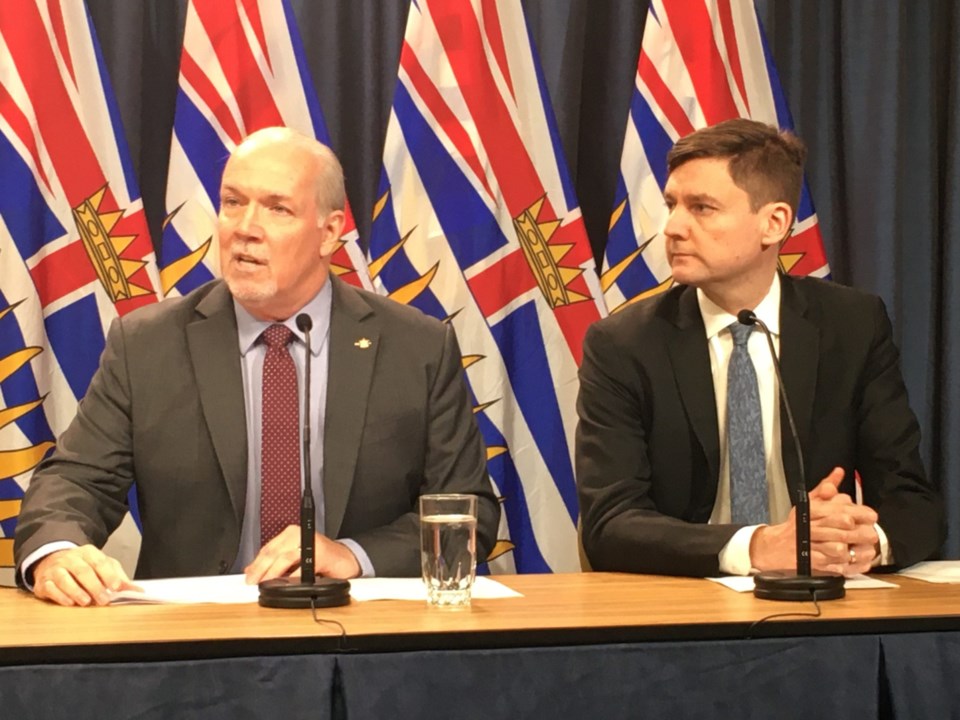The first thing we do, let’s kill all the lawyers.
It’s a famous, if misunderstood, line from Shakespeare (Henry VI Part 2, if you’re curious). It’s also the best way to sum up the NDP’s radical overhaul of auto insurance in BC, which they themselves call a “too good to be true” solution to BC’s ICBC woes.
Obviously not literally killing lawyers – just pretty much excising them and their legal fees from the process.
Yesterday, the NDP announced a major reversal: they will introduce legislation this spring to bring in what’s commonly referred to as “no-fault” insurance. (The NDP bristle at that label, preferring their in-house “Enhanced Care” term.)
What does no-fault mean? The NDP says it means lower premiums (an average savings of $400), and substantially increased benefits for care, treatment, and lost wages. Drivers will be paying less and getting more.
How is that possible? Again, by killing (okay, “killing”) all the lawyers. ICBC has been spending more and more on legal fights against higher and higher claims, losing an estimated $700 million this year, and $960 million by 2022.
The big change is severely restricting the ability (and incentive, because in theory benefits will be more readily accessible) to sue after an accident. The effect to the provincial coffers will be substantial – more than $1 billion per year almost entirely due to removing legal costs.
How is that possible? Again, by killing (okay, “killing”) all the lawyers.
Why go after the lawyers? The government’s materials describe the situation like this: public auto insurance faces a “trilemma.” You’ve heard the expression, “Things can be good, fast, or cheap – you can have two, but not all three.”
Same idea.
In this case, the three choices are affordable premiums, quality care, and the ability to seek damages through the tort system. Again – you can only have two. ICBC was trying to do all three, and not succeeding.
The way this was presented in yesterday’s briefings and news conference, this move is win-win (more benefits, lower premiums), obvious, and not even theoretical; broadly comparable models exist in Saskatchewan and Manitoba.
ICBC was trying to do all three, and not succeeding.
The obvious question: if this was so, well, obvious – why did it take this long? Until very recently, Premier John Horgan and Attorney General David Eby had been quite clear: no-fault was not being considered, so stop asking. So what happened?
Late yesterday, Eby admitted to the Vancouver Sun’s Rob Shaw that this had indeed been a difficult reversal, borne of an admitted lack of understanding both of how deep ICBC’s problems ran, and the legal system’s inability to change. And both Eby and Horgan have also conceded that ICBC has trust and credibility issues with the general public.
In other words, it turned out they couldn’t just blame the previous government and wash their hands; the problem was systemic.
Adding to that, it’s fair to suppose veteran elements within the NDP were gun shy from their abrupt retreat when they tried to reform ICBC in the ’90s – and also, as Horgan alluded to, reluctant to fiddle too much with Dave Barrett’s creation. (Fairly or unfairly, ICBC is part of the BC NDP catechism.)
Will the new system work? We won’t know for a few years, and that’s assuming it survives vigorous legal challenge(s) from organizations like the Trial Lawyers Association, fresh from successfully overturning the NDP’s last major ICBC changes.
Blaming lawyers is always an inspired political move.
Whether or not it survives, politically, it’s a smart move. Just a couple of hours after the announcement, the NDP Caucus quickly issued a release that neatly summarizes how they’re framing this: they’re standing up for you, and anyone who disagrees (like, oh, just for example, Andrew Wilkinson and the BC Liberals) are on the side of the bloodsucking lawyers.
Blaming lawyers is always an inspired political move. But the proof will come before the next election: can Eby keep his promise of cutting auto insurance rates by 20%? The public is bound to be skeptical – and not just because it really does sound too good to be true.
For one thing, it’s hard to overstate just how abruptly this departs from the NDP’s previously spirited defence of the court system. For example, Eby said he had “seen the harms that (no-fault) can cause people who are dependent on the existing system on a very firsthand basis. I’ve seen the benefits of the tort system for accident victims through my father’s practice, through the practice of my colleagues and the practice of law as a lawyer before coming to government.” This wasn't an isolated quote.
Maybe only the most politically engaged will notice or care, and most of them already know how they’re voting. But drivers certainly noticed rate hikes, after the NDP swore up and down that only “bad” drivers would face higher premiums. This simply wasn’t true, and every month more people posted their personal increases on social media.
So, yes. Just like ICBC faces a trust and credibility gap, when the government has a Road to Damascus moment and suddenly discovers they can offer more benefits for less money – just in time for an election – it’s only natural to be skeptical.
Maclean Kay is Editor in Chief of The Orca
SWIM ON:
- Almost exactly a year ago, a poll indicated British Columbians want choice in auto insurance - it was up to the parties to listen.
- Last month, a new study indicated British Columbians simply pay more for comparable auto insurance.
- In April, insurance industry insider Charlie Grahn broke down ICBC's "deep, comprehensive, and structural" problems.



